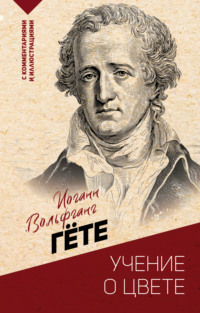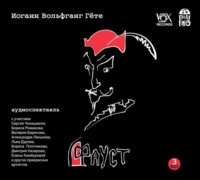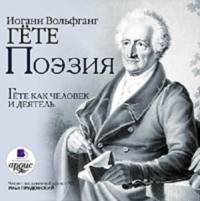 полная версия
полная версияThe Autobiography of Goethe
Lavater's Sketch of the Stolbergs.
"The complexion is not the pale one of all-creating, all-consuming genius; not the wildly glowing one of the contemptuous destroyer; not the milk-white one of the blond; not the olive one of the strong and hardy; not the brownish one of the slowly plodding peasant; but the white, the red, and the violet, running one into another, and so expressively, and so happily, blended together like the strength and weakness of the whole character. The soul of the whole and of each single feature is freedom, and elastic activity, which springs forth easily and is as easily repulsed. The whole fore-face and the way the head is carried, promise magnanimity and upright cheerfulness. Incorruptible sensibility, delicacy of taste, purity of mind, goodness and nobleness of soul, active power, a feeling of strength and of weakness, shine out so transparently through the whole face, that what were otherwise a lively self-complacency dissolves itself into a noble modesty, and most artlessly and unconstrainedly the natural pride and vanity of youth melt with the loveliness of twilight into the easy majesty of the whole man. The whitish hair, the length and awkwardness of form, the softness and lightness of step, the hesitating gait, the flatness of the breast, the fair unfurrowed brow, and various other features spread over the whole man a certain feminine air, by which the inward quickness of action is moderated, and every intentional offence and every meanness made for ever impossible to the heart; but at the same time clearly evincing that the spirited and fiery poet, with all his unaffected thirst for freedom and for emancipation, is neither destined to be a man of business, thoroughly persistent, who steadily and resolutely carries out his plans, or to become immortal in the bloody strife. And now, in conclusion, I remark, for the first time, that I have as yet said nothing of the most striking trait – the noble simplicity, free from all affectation! Nothing of his childlike openness of heart! Nothing of the entire unconsciousness of his outward nobility! Nothing of the inexpressible bonhommie with which he accepts and bears reproaches or warnings, nay, even accusations and wrongful charges.
"But who can find an end, who will undertake to tell all that he sees or feels in a good man, in whom there is so much pure humanity?"
DESCRIPTION OF THE ELDER STOLBERG"What I have said of the younger brother – how much of it may be said also of the elder! The principal thing I have to remark is the following: —
"This figure and this character are more compact and less diffuse than the former. There all was longer or flatter; here all is shorter, broader, more arched, and rounded; there all was vague; here everything is more precise and sharply defined. So the brow; so the nose; so the breast: more compressed, more active, less diffuse, more of concentrated life and power! For the rest, the same amiableness and bonhommie! Not that striking openness, rather more of reserve, but in principle, or rather in deed, the same honorable tone. The same invincible abhorrence of injustice and baseness; the same irreconcilable hatred of all that is called cunning and trickery; the same unyielding opposition to tyranny and despotism; the same pure, incorruptible sensibility to all that is noble, and great, and good; the same need of friendship and of freedom, the same sensitiveness and noble thirst for glory; the same catholicity of heart for all good, wise, sincere, and energetic men, renowned or unrenowned, known or misunderstood, – and the same light-hearted inconsiderateness. No! not exactly the same. The face is sharper, more contracted, firmer; has more inward, self-developing capacity for business and practical counsels; more of enterprising spirit – which is shown especially by the strongly prominent and fully rounded bones of the eye-sockets. Not the all-blending, rich, pure, lofty poet's feeling – not the ease and rapidity of the productive, power which marks the other – but yet he is, and that in profounder depths, vivacious, upright, ardent. Not the airy genius of light floating away in the morning red of heaven, and fashioning huge shapes therein – but more of inward power, though perhaps less of expression! more powerful and terrible – less of elegance and finish; though his pencil nevertheless wants neither coloring nor enchantment. More wit and riotous humor; droll satire; brow, nose, look – all so downward, so over-hanging – decidedly what it should be for original and all-enlivening wit, which does not gather from without, but brings forth from within. Above all in this character every trait more prominent, more angular, more aggressive, more storming! No passive dullness, no relaxation, except in the sunken eyes, where, as well as in the brow and nose, pleasure evidently sits. In all besides – and even in this very brow, this concentration of all – in this look indeed – there is an unmistakable expression of natural, unacquired greatness; strength, impetuosity of manliness; constancy, simplicity, precision!"
After having in Darmstadt conceded to Merck the justice of his opinions and allowed him to triumph, in his having predicted my speedy separation from these gay companions, I found myself again in Frankfort, well received by every one, including my father, although the latter could not conceal his disappointment that I had not descended by the pass to Airolo, and announced to him from Milan my arrival in Italy. All this was expressed by his silence rather than his words; but above all he did not show the slightest sympathy with those wild rocks, those lakes of mist, and dragons' nests.
At last, however, by an incidental remark, by no means intended for a reproach, he gave me to understand how little all such sights were worth: he who has not seen Naples, he observed, has lived to no end.
My Meeting again with Lili.
On my return I did not, I could not, avoid seeing Lili; the position we maintained towards each other was tender and considerate. I was informed that they had fully convinced her in my absence, that she must break off her intimacy with me, and that this was the more necessary and indeed more practicable, since by my journey and voluntary absence, I had given a sufficiently clear intimation of my own intentions. Nevertheless, the same localities in town and country, the same friends, confidentially acquainted with all the past, could scarcely be seen without emotion by either of us – still and for ever lovers, although drawn apart in a mysterious way. It was an accursed state, which in a certain sense resembled Hades, or the meeting of the happy with the unhappy dead.
There were moments when departed days seemed to revive, but instantly vanished again, like ghosts.
Some kind people had told me in confidence, that Lili, when all the obstacles to, our union were laid before her, had declared that for my love she was ready to renounce all present ties and advantages, and to go with me to America. America was then perhaps, still more than now, the Eldorado of all who found themselves crossed in the wishes of the moment.
But the very thing which should have animated my hopes, only depressed them the more. My handsome paternal house, only a few hundred steps from hers, offered certainly a more tolerable and more attractive habitation than an uncertain and remote locality beyond the ocean; still I do not deny, that in her presence all hopes, all wishes sprang to life again, and irresolution was stirring within me.
True, the injunctions of my sister were very peremptory and precise; not only had she, with all the shrewd penetration of which she was mistress, explained the situation of things to me, but she had also, with painfully cogent letters, harped upon the same text still more powerfully. "It were very well," said she, "if you could not help it, then you would have to put up with it; such things one must suffer but not choose." Some months passed away in this most miserable of all conditions; every circumstance had conspired against the union; in her alone I felt, I knew, lay the power which could have overcome every difficulty.
Both the lovers, conscious of their position, avoided all solitary interviews; but, in company, they could not help meeting in the usual formal way. It was now that the strongest trial was to be gone through, as every noble and feeling soul will acknowledge, when I have explained myself more fully.
It is generally allowed, that in a new acquaintance, in the formation of a new attachment, the lover gladly draws a veil over the past. Growing affection troubles itself about no antecedents, and as it springs up like genius with the rapidity of lightning, it knows nothing either of past or future. It is true, my closer intimacy with Lili had begun by her telling me the story of her early youth: how, from a child up, she had excited in many both a liking and devotion to herself, especially in strangers visiting her father's gay and lively house, and how she had found her pleasure in all this, though it had been attended with no further consequences and had lead to no permanent tie.
Lili's Old Lovers.
True, lovers consider all that they have felt before only as preparation for their present bliss, only as the foundation on which the structure of their future life is to be reared. Past attachments seem like spectres of the night, which glide away before the break of day.
But what occurred! The fair came on, and with it appeared the whole swarm of those spectres in their reality; all the mercantile friends of the eminent house came one by one, and it was soon manifest that not a man among them was willing or able wholly to give up a certain claim to the lovely daughter. The younger ones, without being obtrusive, still seemed to claim the rights of familiar friends; the middle-aged, with a certain obliging dignity, like those who seek to make themselves beloved, and who in all probability might come forward with higher claims. There were fine men among them, with the additional recommendation of a substantial fortune.
The older gentlemen, with their uncle's ways and manners, were altogether intolerable; they could not bridle their hands, and in the midst of their disagreeable twaddle would demand a kiss, for which the cheek was not refused. It was so natural to her, gracefully to satisfy every one. The conversation, too, excited many a painful remembrance. Allusion was constantly made to pleasure parties by water and by land, to perils of all kinds with their happy escapes, to balls and evening promenades, to the amusement afforded by ridiculous wooers, and to whatever could excite an uncomfortable jealousy in the heart of an inconsolable lover, who had, as it were, for a long time drawn to himself the sum of so many years. But amid all this crowd and gaiety, she did not push aside her friend, and when she turned to him, she contrived, in a few words, to express all the tenderness which seemed allowable to their present position.
But let us turn from this torture, of which the memory even is almost intolerable, to poesy, which afforded, at least, an intellectual and heartfelt alleviation of my sufferings.
"Lili's Menagerie" belongs somewhere to this period; I do not adduce the poem here, because it does not reveal the softer sentiment, but seeks only, with genial earnestness, to exaggerate the disagreeable, and by comical, and provoking images, to change renunciation into despair.
The following song expresses rather the sweeter side of that misery, and on that account is here inserted:
Sweetest roses, ye are drooping,By my love ye were not worn;Bloom for one, who past all hoping,Feels his soul by sorrow torn.Oh, the days still live in thought, love,When to thee, my angel, bound;I my garden early sought, love,And for thee the young buds found.All the flowers and fruits I bore thee,And I cast them at thy feet;As I proudly stood before thee,Then my heart with hope would beat!Sweetest roses, ye are drooping,By my love ye were not worn;Bloom for one, who past all hoping,Feels his soul by sorrow torn.The opera of "Erwin and Elvira" was suggested by the pretty little romaunt or ballad introduced by Goldsmith in his "Vicar of Wakefield," which had given us so much pleasure in our happiest days, when we never dreamed that a similar fate awaited us.
I have already introduced some of the poetical productions of this epoch, and I only wish they had all been preserved. A never failing excitement in the happy season of love, heightened by the beginning of care, gave birth to songs, which throughout expressed no overstrained emotion, but always the sincere feeling of the moment. From social songs for festivals, down to the most trifling of presentation-verses – all was living and real and what a refined company had sympathized in; first glad, then sorrowful, till finally there was no height of bliss, no depth of woe, to which a strain was not devoted.
All these internal feelings and outward doings, so far as they were likely to vex and pain my father, were by my mother's bustling prudence skilfully kept from him. Although his hope of seeing me lead into his house, that first one (who had so fully realised his ideas of a daughter-in-law) had died away, still this "state-lady," as he used to call her in his confidential conversations with ms wife, would never suit him.
Nevertheless he let matters take their course, and diligently occupied himself with his little Chancery. The young juristic friend, as well as the dexterous amanuensis, gained continually more and more of influence under his firm. As the absentee was now no longer missed there, they let me take my own way, and sought to establish themselves firmly upon a ground on which I was not destined to thrive.
Fortunately my own tendencies corresponded with the sentiments and wishes of my father. He had so great an idea of my poetic talents, and felt so personal a pleasure in the applause which my earliest efforts had obtained, that he often talked to me on the subject of new and further attempts. On the other hand, I did not venture to communicate to him any of these social effusions and poems of passion.
Plan of Egmont.
As, in Götz von Berlichingen, I had in my own way mirrored forth the image of an important epoch of the world, I now again carefully looked round for another crisis in political history of similar interest. Accordingly the Revolt of the Netherlands attracted my attention. In Götz, I had depicted a man of parts and energy, sinking under the delusion that, in times of anarchy, ability and honesty of purpose must have their weight and influence. The design of Egmont was to shew that the most firmly established institutions cannot maintain themselves against a powerful and shrewdly calculating Despotism. I had talked so earnestly with my father about what the piece ought to be, and what I wanted to do, that it inspired him with an invincible desire to see the plan which I had already worked out in my head, fairly set down on paper, in order to its being printed and admired.
In earlier times, while I still hoped to gain Lili's hand, I had applied myself with the utmost diligence to the study and practice of legal business, but now I sought to fill the fearful gulf which separated me from her, with occupations of more intellect and soul. I therefore set to work in earnest with the composition of Egmont. Unlike the first Götz von Berlichingen, however, it was not written in succession and in order; but immediately after the first introduction I went at once to the main scenes without troubling myself about the various connecting links. I made rapid progress, because my father, knowing my fitful way of working, spurred me on (literally and without exaggeration) day and night, and seemed to believe that the plan, so easily conceived, might as easily be executed.
TWENTIETH BOOK
Kraus – Daemonic Influence – Heidelberg – Departure for WeimarAnd so I got on rapidly with my "Egmont;" and while I found in this some alleviation of my wounded passion, the society of a clever artist also helped me through many wearisome hours. And thus, as had often before been the case, a vague desire of practical improvement brought me a secret peace of mind, at a time when it could scarcely be hoped for.
George Melchior Kraus, who had been born at Frankfort, but educated in Paris, having just returned from a short tour to the north of Germany, paid me a visit, and I immediately felt an impulse and a need to attach myself to him. He was a cheerful merry fellow, whose light joyous disposition had found its right sphere in Paris.
At that time Paris promised a pleasant welcome for Germans; Philip Hackert was residing there in credit and opulence; the true German style in which, both in oil and water-colors, he faithfully executed landscapes after nature, met with great favor, as contrasted with the formal mannerism into which the French had fallen. Wille, in high esteem as a copperplate engraver, supported and made German excellence more widely known. Grimm, already an artist of some influence, rejoiced to help his countrymen. Pleasant excursions, in order to take original sketches from nature were constantly undertaken, in which much of undoubted excellence was either executed or designed.
Boucher and Watteau, both of them artists born, whose works, though fluttering in the style and spirit of the time, were always highly respectable, were favorably inclined to the new school, and even took an active part in their excursions, though only for the sake of amusement and experiment. Greuze, living quietly by himself in his family circle, and fond of representing such domestic scenes, seemed delighted with his own works, held an honored and easy pencil.
All these several styles our townsman Kraus was able to take up and blend with his own particular talent; he formed himself in school after school, and was skilful in his portrait-like delineations of family and friendly gatherings; equally happy was he in his landscape sketches, which cordially commended themselves to the eye by their clear outlines, massive shadows, and agreeable coloring. The inward sense was satisfied by a certain naïve truth, while the admirer of artistic skill was especially pleased with the tact by which he arranged and grouped into a picture what he had copied singly from nature.
He was a most agreeable companion; a cheerful equanimity never failed him; obliging without obsequiousness, reserved without pride, he was everywhere at home, everywhere beloved, the most active, and, at the same time, the most manageable of all mortals. With such talents and of such a disposition, he soon won the favor of the higher circles; but he was especially well received at the castle of the Baron von Stein, at Nassau on the Lahn, whose accomplished and lovely daughter he assisted in her artistic studies, and in many ways enlivened the whole circle.
Upon the marriage of this excellent lady to the Count von Werther, the newly wedded couple took the artist with them to Thuringia, where the Count possessed a large estate, and thus he got to Weimar. His acquaintance was immediately sought, his talents were appreciated – and a wish expressed that he would fix his permanent abode there.
Obliging as he was to everybody, upon his return at this time to Frankfort, he stimulated my love of art, which had been contented with merely collecting, and to making practical essays. The neighbourhood of the artist is indispensable to the Dilettante, for the latter sees all that is wanting in himself supplied by the former; the wishes of the amateur are fulfilled in the artist.
By a certain natural talent, assisted by practice, I succeeded pretty well in an outline, and I could give the shape of all that I saw before me in nature; but I wanted the peculiar plastic power, the skilful industry, which lends a body to the outline by well-graduated light and shade. My copies were rather remote suggestions of the real form, and my figures like those light airy beings in Dante's Purgatory, which, casting no shadow themselves, fled affrighted at the shadows of actual bodies.
Lavater's fishing for physiognomical treasures – for so we may well designate the importunate urgency with which he called upon all men, not only to observe physiognomies, but also practically to make, be it artistic or most bungling attempts at copying faces, led me into the habit of taking the portraits of all my friends on grey paper, with black and white chalk. The likeness was not to be mistaken, but it required the hand of my artistic friend to make them stand out from the dark background.
Kraus the Artist.
In turning over and looking through the rich portfolio of drawings which the good Kraus had taken during his travels, we had most pleasant talk together when he came to the sketches of scenes and persons in and about Weimar. On such paintings I, too, was glad to dwell, and you may imagine that it must have been flattering to the young man, to see in so many pictures only the text which was to lead to a circumstantially repeated exclamation: they would be glad to see him there. With much grace he would imitate the different persons whose portraits he had taken and impersonate the greetings and invitations he had received. One very successful oil-painting represented the musical director, Wolf, at the piano, with his wife behind him preparing to sing; and this gave the artist opportunity to assure me in earnest terms, of the warm welcome this worthy pair would give me. Among his sketches were several of the wood and mountain scenery around Bürgel. Here an honest forester, more perhaps to please his pretty daughters than himself, had by means of bridges, railings, and mossy paths, opened pleasant and sociable walks through the rough masses of rocks, thickets, and plantations. In one of these beautiful promenades he had painted the fair damsels in white dresses, and not without their attendant cavaliers. In one of these you immediately recognized Bertuch, whose serious designs upon the oldest daughter were openly avowed; and Kraus was not offended if you ventured to refer a second youth to himself, and guessed his growing attachment to the sister.
Bertuch, as the pupil of Wieland, had so distinguished himself in science and in business, that already appointed private secretary of the Duke, he had the best possible prospects before him. From him we passed to Wieland and talked at length of his rectitude, and cheerfulness, and kindly disposition; his fine literary and poetical designs were dwelt upon, and allusions were made to the influence of the Merkur throughout Germany; many other names of literary, political, or social distinction were also mentioned, and among them. Musæus, Kirms, Berendis, and Ludecus. Of women, the wife of Wolf, and a widow Kotzebue, with a lovely daughter and a bright boy, were, among many others, characterized and extolled. Everything seemed to point to a fresh and active life of literature and art.
And so, by degrees, were exhibited all the various elements upon which the young Duke was, on his return, to work. His mother and guardian had prepared this state of things, while, as regarded the introduction of more important measures, all that, in accordance with the duty of such provisional governments, was left to the judgment and decision of the future sovereign. The sad ruin caused by the burning of the palace was already looked upon as furnishing occasion for new improvements. The mines at Ilmenau, which had stopped working, but which, it was asserted, might again be made profitable by going to the great expense of repairing the deep shaft; – the university at Jena, which was somewhat behind the spirit of the age, and was consequently threatened with the loss of some of its most able teachers, – and many other matters, roused a noble common interest. Already were looks cast around for persons, who, in the upward struggle of Germany, might be qualified to further such various designs for good, and the prospect seemed as fresh as the vivacity and energy of youth could desire. And if it seemed sad to bring a young princess not to a home, of a suitable princely dignity, but to a very ordinary dwelling built for quite a different object; still such beautifully situated and well contrived country-houses as Ettenburg, Belvedere, and other delightful pleasure-seats, gave enjoyment for the present, and also a hope that the life of nature thus rendered necessary, might lead to profitable and agreeable occupations.









